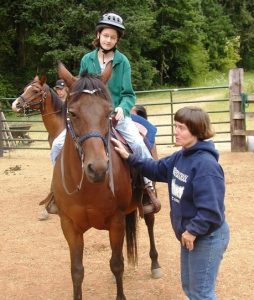What We Do
The mission of 4-H is to provide young people with intentional, high quality learning experiences that promote positive interactions with adults and peers, sustained and active participation across time, and opportunities to make meaningful contributions to the world around them.

4-H programming is based on the theory and practice of positive youth development. Positive youth development is an approach that builds internal assets and community supports that enable young people to experience economic and social success in adulthood and make positive contributions to communities.
About the Oregon 4-H Youth Development Residential Camp Program
by Mary E. Arnold, Ph.D.
4-H residential camps are a big part of 4-H programming in Oregon. Residential camps provide a perfect context for positive youth development by immersing youth in a temporary living community, where they can experience high-quality learning experiences that promote thriving. Thriving youth are youth who are doing well—they tend to think, feel, and act in ways that puts them on a positive track of development.
4-H camping programs support thriving by:
- Encouraging campers to be open to challenge and discovery—encouraging the desire and courage to explore new things, try new activities, and learn about new things. This ‘growth mindset”2 is important for healthy development, and it can be nurtured by the many opportunities for learning and discovery that 4-H provides.
- Developing pro-social awareness– helping youth care about others and increase their moral and ethical commitments. They also seek more meaningful connections to others and ways to contribute to society.3 An enduring hallmark of the 4-H program is the emphasis on service to others. In fact, research shows that 4-H members are engaged in service to others far more often than other youth4.
- Positive emotionality is another indicator of thriving youth– thriving youth possess emotional competence, good social skills, confidence and positive relationships. These “socio-emotional skills” are increasingly important for success in work and life5. The 4-H program helps youth develop positive emotionality through it emphasis on skill building, responsibility, & teamwork.5
- Providing opportunities to develop intentional self-regulation, which refers to being able to set and achieve goals, and persevere with there are setbacks, as well as to develop independence, critical thinking, and decision making skills. Youth who are skilled at self-regulation can make good decisions, handle independence, set and modify goals, and reorient themselves in the face of adversity6. Setting, monitoring progress, and achieving goals is an important aspect of the 4-H experience. Youth are encouraged to keep track of their goals and progress by keeping a 4-H record book.
Thriving youth are more likely to achieve important developmental outcomes like:
- Increased academic motivation and success
- Higher social competence and personal standards
- Feeling more connected to others
- Contributing more to their communities—all of which are outcomes for the 4-H program.

